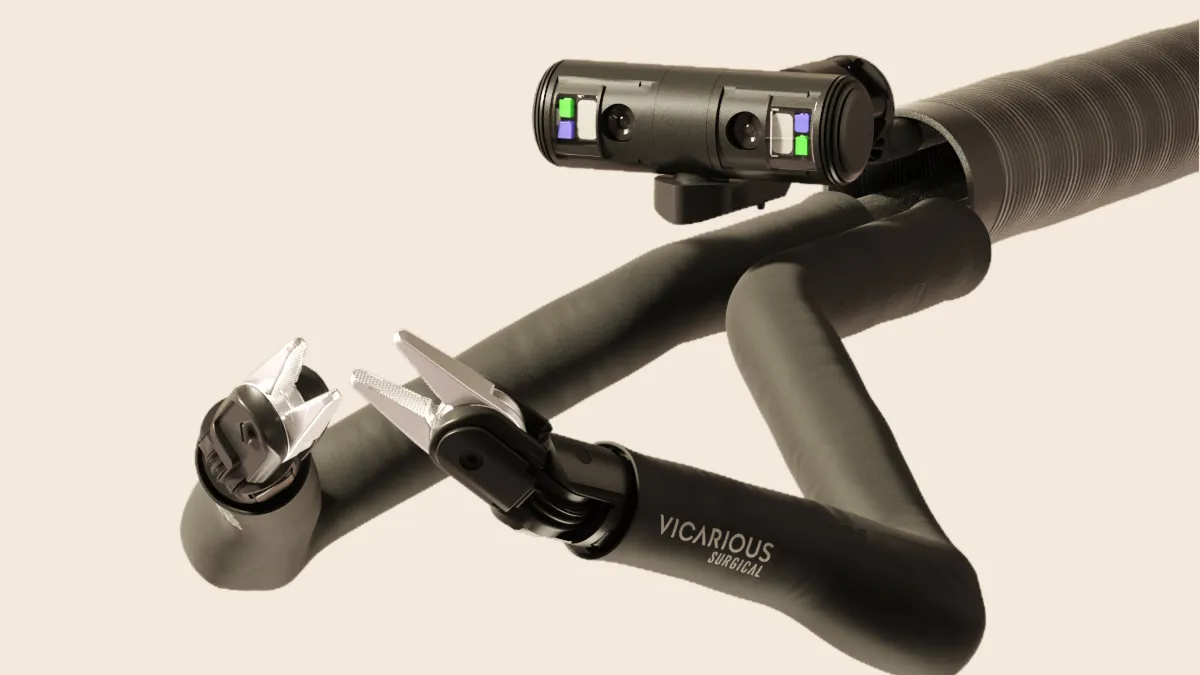Dive Brief:
- Vicarious Surgical has extended the timeline for developing its surgical robot by 12 to 18 months to preserve cash, pushing out an anticipated filing for authorization until early to mid 2026.
- Seeking to reduce cash burn by up to $20 million next year, the medtech company is downsizing its R&D team and reducing spending on contractors. The changes, which will force Vicarious to do tasks in sequence, rather than in parallel, and “integration challenges” delayed the project.
- CFO Bill Kelly told investors on a Monday earnings call that the spending plan will enable Vicarious to keep going into 2026, but BTIG analysts warned the company is “walking a very tight rope” and downgraded the stock.
Dive Insight:
Vicarious is developing a surgical robot that is designed to provide abdominal access and visualization through a single port. In July, the company said the integration and build of system units was on track for the fall of 2023. Vicarious raised money in August, persuading investors to fund a strategy that called for the company to be in the clinic by mid-2024 and file a de novo authorization application in early 2025.
Management tore up that timeline this week.
Vicarious CEO Adam Sachs set out the current situation on a quarterly result conference call with investors, explaining that the team is “hitting some speed bumps as we bring all of these subsystems together, but we expect them to be up and running fairly shortly.” The challenges are arising as Vicarious works to integrate the camera, arms and other devices that make up its surgical robot.
“Most components are functioning effectively, but we're starting to encounter some software challenges, which are then, as things come up, uncovering some hardware challenges,” Sachs said. “They're nothing that's particularly significant ... really just a one- or probably two-quarter delay there.”
The rest of the delay stems from the fact the team in place to work through those challenges is getting smaller. Vicarious spared R&D when it cut costs in February, but it is now reducing the size of the team. The R&D group was 5% smaller in the third quarter of 2023 than in the prior-year’s period, falling in size from an average of 153 people to an average of 146 people.
Sachs told investors Vicarious had made “the difficult decision to once again downsize our team” without sharing details of the number of positions affected. The CEO did discuss the types of roles affected by the layoffs, explaining that Vicarious has targeted R&D positions that were “working on remediating things that we expect to come up.” Instead of proactively remediating, Vicarious will fix issues as they arise.
The approach, which Sachs called a “more serial, more capital efficient, but slower method,” will help Vicarious to cut its cash burn to a range of from $40 million to $55 million next year, compared with a forecast of from $60 million to $65 million this year. Vicarious expects the changes will extend its cash runway into the first quarter of 2026, a prediction that suggests it will need more cash to get to market.
“[Vicarious] is walking a very tight rope with limited resources (and limited room for error),” BTIG analysts wrote in a note to investors. “Even with cash burn reduced, there is still risk that these development timelines could extend further and the macroenvironment may not allow the company to get the capital it needs to get to de novo clearance.”
Correction: In a previous version of this article, the Vicarious Surgical earnings call was stated as taking place on Tuesday. The earnings call was on Monday.











